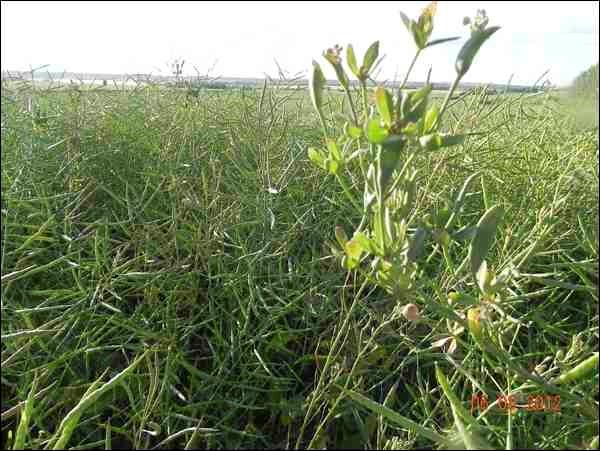Canola seed is expensive and you want to ensure that the seed you put in the ground has the best chance of producing a healthy vigorous seeding. Canola emergence can be calculated as the number of plants that emerge divided by the number of seeds put in the ground. With canola, this number varies but on average is between 40 to 60 per cent. This means that half of the seed planted does not develop into viable plants. This seems like a lot but with small seeded crops it is not unusual. In fact, there are cases where the emergence can be much lower. With the cost of canola seed and the return potential, ensuring good emergence is important. Some factors that are under our control that can affect canola emergence are soil temperature, seed placed fertilizer, seeding depth and wind speed.
Soil temperatures vary from region to region, field to field and with depth. Taking temperatures at seeding depth is important to get accurate readings. As seeding approaches and soils warm up, it is important to take the temperature at least two times during the day, morning and afternoon, and then average the readings. Canola can germinate at temperatures around five degrees Celsius but prefer 15 to 20 degrees for optimum germination. The cooler the temperatures the slower the germination process and the longer the seed and seedling remains in the soil and becomes susceptible to diseases. Warmer temperatures speed up germination and enhance emergence.
While waiting for the soil to warm up there is some consideration that should be given to the amount of seed placed fertilizer. There are recommendations on how much nitrogen and phosphorous can be placed with the seed and it depends on the width of the seed spread behind the opener, the row spacing, the soil texture and the soil moisture content. Check with your local agronomist or crop specialist for the rates appropriate for your operation.
At seeding time there are still some things to consider. Careful handling of the canola seed is important. The thin seed coat with canola can easily be damaged by auguring or by high wind speeds in the air seeding system. Collecting a seed sample as it comes out of the opener can be done by placing a sock or bag over a few openers or hose ends while running the seeder. This sample can then be used to identify if damage has occurred and if adjustments need to be made prior to seeding. Ensuring good quality seed is put into the ground is an important step. Keeping a sample of seed from the bad is also a good idea in case there are emergence issues and seed quality is suspect.
Seeding depth is also critical. Canola is small seed and therefore does not have a large energy reserve to allow it to emerge from depths. Typically canola should be seeded shallow at 12 to 25 mm (1/2 to 1 inch) into moist firm soil. Once seeding depth has been established it is important to ensure that the seeding depth is uniform across all the rows. Seeding speed can impact the uniformity of seeding depth. Seeding faster than optimum can lead to uneven seeding depth and a breakdown of seed and fertilizer separation. Uneven emergence leads to uneven stages that makes timing of herbicide and fungicide applications difficult. Uneven maturity makes swathing decisions challenging and can lead to increased green seed or increased losses due to shattering.
In summary, there are many factors under our control that can affect canola emergence. Seeding into warm soil, watching the amount of seed placed fertilizer, minimizing seed coat damage and seeding at uniform depths can all influence the emergence. Spending money on good canola seed is a great investment and ensuring the seed has a chance at establishing a good plant stand is important to protect the investment.
For more information on this, or other crops related topics, contact Sherrilyn Phelps at 306-446-7475 or the Agriculture Knowledge Centre at 1-866-457-2377
-Phelps is Regional Crops Specialist, North Battleford Regional Services Branch

.png;w=120;h=80;mode=crop)


